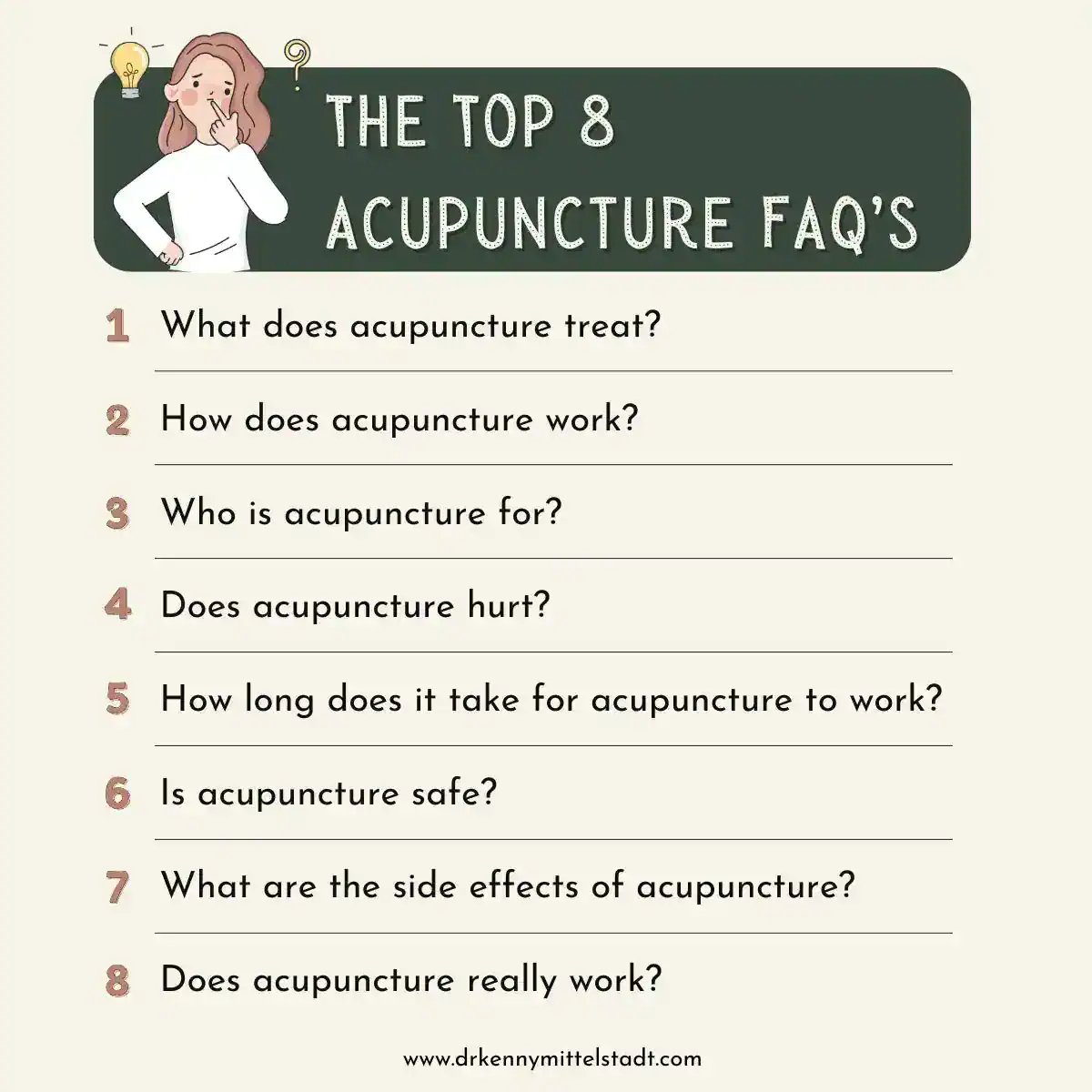It’s no surprise that Acupuncture remains the most common traditional medicine practice in the world. (WHO, 2021). It has been practiced and time-tested for thousands of years.
It’s also becoming more popular in the United States as conventional medicine is recognizing its benefits. The most recent survey from the NIH in 2022 showed the number of Americans using acupuncture for pain more than doubled in 20 years from 2002 to 2022 .
With so many people looking for more holistic answers to their health, acupuncture is certainly a modality that stands out.
If you’re considering acupuncture treatment, there are many questions that come up. I will try to answer the top 8 most common questions that patients generally have for me their first time!
Let’s dive in!

1. What Does Acupuncture Treat?
To answer this question, I like to simply respond that,
“Acupuncture and Chinese medicine is an entire system of medicine.”
As such, the system can be used to approach the treatment of virtually any condition that you may have. The main difference is that Chinese medicine uses a completely different language and framework to describe the same conditions in conventional medicine.
Currently, the most commonly recognized application of acupuncture in the U.S is for pain management. Most of the available research is in the realm of managing pain condition, but the body of evidence continues to grow.
In fact, The American College of Physicians issued the following clinical practice guideline. Acupuncture is beneficial as first line defense against chronic low back pain when compared to usual care (2020).
Here is a short list of other conditions that acupuncture may be useful for:
- Low Back Pain and Neck Pain
- Headaches and Migraines
- Insomnia and Fatigue
- Menstrual Pain and Irregular Menstruation
- Male and Female Infertility, IVF Support
- Irritable Bowel Syndrome
- Depression and Anxiety
- High Blood Pressure
- Allergies
- Arthritis
- Addiction
Check out this summary of potential usages of acupuncture from John Hopkins University for a more comprehensive list.
2. How Does Acupuncture Work?
To simplify this answer, I generally tell patients that acupuncture works in two main ways. First, it works on the nervous system and second, it works in the blood (or humoral) system.
The Effects of Acupuncture on the Nervous System
I tell patients that acupuncture is basically a “positive workout for the nervous system.” We live in a world that exposes us to constant “fight or flight” states. This can lead to all kinds of imbalances in the nervous system such as HPA Axis Dysfunction, fatigue, and insomnia.
Acupuncture acts by activating the “rest and digest” part of the nervous system. This directly balances out our “fight or flight” response and is the basis for how acupuncture acts in many conditions that require a return to a balanced state of the nervous system.
You can think of acupuncture as a way to resensitize our bodies to this restful, restoring state of our nervous system.
Acupuncture has also been shown to modulate our experience of pain. It achieves this by overriding chronic pain signals to the brain. The mechanism by which it works for pain is founded in neurobiological and physiological principles.
The Effects of Acupuncture in the Blood and Circulation
The simple insertion of acupuncture needles into the body prompts a response in our blood. Our bodies respond by releasing “natural painkillers” and other “feel good chemicals” that have an effect both locally and in our circulation.
In the same way that we are “resensitizing” the nervous system, acupuncture does the same at the level of the blood and circulation. We are “tapping into” your bodies natural immune response.
3. Who is Acupuncture for?
To be succinct, acupuncture is for almost anyone and everyone. Whether pediatric, pregnant, or are on blood thinners, acupuncture is a treatment option.
There are only a few situations where acupuncture may not be appropriate:
- Active infection, especially of the skin or malignancy
- Electroacupuncture should be avoided in patients with implants such as an AICD (Automatic Implantable Cardioverter Defibrillator)
- Patients experiencing mental psychosis or delusions
Acupuncture is generally considered safe beyond these situations mentioned above.
4. Does Acupuncture Hurt?
In general, acupuncture does not hurt. I always walk patients through the potential sensations they may feel. I also emphasize that we’ll be talking back and forth the whole time during a treatment, so they can offer feedback throughout the treatment.
It’s common to feel a small pinch while a needle is first inserted. Then the pinch should immediately subside. Acupuncture needles are dramatically smaller than a syringe used for vaccinations or blood draws, and so the sensation experienced is much less as well.
In my experience, some patients feel very few of the needles overall, especially the first few treatments. This seems to correlate with how “desensitized” their nervous systems are.
Normal sensations to feel from acupuncture needles include:
- Initial pinch
- Pressure
- Dull achiness
- Distention
- Radiation of sensation
- Tingling, mild numbness
Once the needles are in, patients generally relax with the needles for 15-30 minutes depending on the treatment and practitioner. During this time, many patients get into a very relaxing state and even fall asleep. Ultimately, the experience is very comfortable!
5. How Long Does it Take Acupuncture to Work?
The number of acupuncture sessions required to assess efficacy varies. It depends on the patient and the condition being treated. Just like any treatment, conventional or traditional, a number of people might be considered non-responders to treatment.
For chronic conditions including pain, I generally recommend 4-6 treatments over 2-3 weeks before making a judgment call. In most patients, they should notice changes in their pain severity, frequency, or quality by this time.
If they don’t, I recommend re-evaluating their condition, consider imaging, or refer out for co-managed care if they are not already under conventional care.
Your practitioner should give you a good idea during your consultation about expectations for the length of treatment. Remember, this is unique to your condition or combination of conditions.
6. Is Acupuncture Safe?
Acupuncture is considered very safe. This is especially true when performed by a licensed acupuncturist. Licensed acupuncturists in the U.S. have a masters-level or doctorate-level training before qualifying for national certification and state licensing.
This review compiles available reports of adverse events with acupuncture. It’s worth noting that a significant portion of the adverse events were performed by practitioners or lay people without a specific acupuncture license. These noteworthy events also occur with conventional medicine practitioners performing acupuncture with little formal training.
Additionally, acupuncture needles are single-use, sterile, and surgical-grade steel. You’re the only one they ever touch, and then they go right into a medical sharps container.
When practiced responsibly and according to basic training, acupuncture is very safe. With proper training and competence, such adverse events as infection or lung or organ puncture are explicitly avoided. Make sure that your practitioner is licensed, competent, and communicative! If you have concerns, raise questions to your state acupuncture board.
In the next section, we’ll explore potential side effects based on the best available research reviews to date.
7. What are the Side Effects of Acupuncture?
The most common reactions I see in my patients are local soreness, light local bleeding, or bruising where the needles were placed. In my practice, these occur in less than 5% of my patient visits. So patients may even feel tired or achy after a session.
If a patient experiences local soreness, pain, or bruising, I typically recommend a short ice massage after treatment at home. Otherwise, they can go about their day as normal.
Rare side effects often suggestive of malpractice and incompetence of the practitioner may include infection, organ puncture, nerve damage, or lung puncture (pneumothorax).
Other rare side effects include fainting and dizziness (related to a vasovagal response) or broken or stuck needles.
A well-trained, competent acupuncturist will gladly discuss side effects with you before treatment as part of an informed consent process. Feel free to ask questions and ask about credentialing if you’re seeking acupuncture treatment. The power to choose ultimately belongs to you.
8. Does Acupuncture Really Work?
Acupuncture has been a healing modality for thousands of years. It continues to be explored through the conventional medicine lens in research trials and integrative medicine settings. Most of the available research today looks at acupuncture for the management of pain.
That said, research demonstrates that acupuncture is effective for the management of pain. The body of research continues to grow, but this systematic review showed an average 79.7% treatment success rate using acupuncture for pain.
Additionally, patients are generally satisfied with the care they receive from an acupuncturist. An ASH internal survey of 89,000 acupuncture patients found that 80-87% of those seeking acupuncture treatment rated their practitioners a 9-10 on a 10-point likert scale.
Ultimately, you get to be the judge. Acupuncture may not work for everyone and every condition. But now that you understand a bit more about how acupuncture works, hopefully you feel more engaged and empowered to choose if it might be right for you!
Conclusion:
Hopefully, these questions and answers will help as you’re navigating through your health journey. In my experience, acupuncture has greatly helped me as a part of comprehensive care.
If you have any additional questions beyond these top 8, reach out anytime! I’d be honored to share the information with you.
Remember, health is contagious, share the love. If this article spoke to you, please share with someone who might be interested in the education here! Follow me on Instagram or subscribe to my mailing list below to stay up to date on the latest functional medicine and acupuncture information at Resonate!
About the Author
Dr. Kenny Mittelstadt is a root-cause health detective and functional medicine practitioner practicing in Texas, California, and Florida. Trained through the Institute for Functional Medicine with dual doctorates earned at highest honors from Southern California University of Health Sciences, he helps patients solve complex health issues naturally using advanced functional lab testing and personalized holistic care instead of conventional medications.

